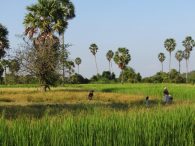
In Kampong Chhnang province, Cambodia, the price of rice is very low that farmers are discouraged to produce rice for commercial purposes. To help rice farmers in the area, Farmer and Nature Net (FNN) communicated with AMRU Rice Company, which was then looking for organic jasmine rice, to partner with Kraing Leav Agriculture Cooperative in Kraing Leav village, Kraing Leav commune, Rolea Phear District.
To facilitate this partnership, FNN did the following:
- Organize ICS training workshop
- Follow-up booklet filed by BOD of cooperative
- Report ICS training to AMRU and Union control
- Accompany Union Control to file monitoring before getting an organic certification

AMRU Rice agreed with the partnership and guaranteed the price of organic rice with the following premiums:
- A price of over 30 riels (USD 0.0074) per kilogram
- AMRU will offer 30 riels per kilogram for the agricultural cooperative to pay for the working days of those in charge of filing the Internal Control System (ICS) booklet, based on the policy/regulation of AC
- AMRU also offers some part of the 30 riels per kilogram to FNN as a fee for facilitating the partnership between the farmers and the Control Union unit.
As a result, Kraing Leav cooperative met with AMRU and agreed to sell 45 tons of organic jasmine rice to the company. In 2018, Kraing Leav Agricultural Cooperative mobilized seven farmers to produce jasmine rice in an area of 15 hectares with a yield expectation of around 45 tons.

Because of the success of the farming contract between the two parties, in 2019, the cooperative increased its production for selling to AMRU from 45 tons to 70 tons.
Innovative Feature
FNN facilitated the meeting between the farmers and the AMRU at the farm site; helped farmers document and share the difficulties they faced; signing of contract farming; set a stable and premium price for the produce, and; help the company to ensure production standard.
It is important to have good communication between the company and the cooperative. The two parties did not know about each other so they did not have a high level of trust so it is essential to help both sides first to establish trust by communicating with each other effectively. FNN played an essential role in facilitating this partnership by providing training on ICS and making sure the rice produce gets an organic certification from the Control Union.

Impact
Smallholder farmers and the company had a win-win deal. The cooperative will be able to sustain development through the premium price for its produce. FNN also received an income from the deal to be used to sustain their projects.
The farmers also had access to quality seeds to improve their production. They also got more income because they made their own compost instead of buying organic fertilizer from the market.
Before, farmers generated the following income:
1,300 riels per kilogram x 3,000 Kg/Ha = 3,900,000 riels (USD 958)
After the contract with AMRU:
1,590 riels per kilogram x 3,000 kilogram per hectare = 6,770,000 riels (USD 1,663)
Farmers will now get an increase of 870,000 Riels (USD 217) in their income per hectare.
By implementing organic rice farming, the community helps create a better environment and supports sustainable development.
Facilitating Factors
- AMRU RICE Company has a good background in working with smallholder farmers. The company understands farmers’ issues and they purchase both organic rice and SRP rice (EU-standard Sustainable Rice Platform).
- Farmers are organized so they easily maintain production standards
- Good communication between the parties involved
- The BOD and controller committees are efficient so it is easy to get organic certification from the Control Union
Lessons Learned
- The contract farming signed by the company with BOD and FNN is important to make sure the farmers produce what is expected of them
- Conducting ICS training for Controller committees before the production of organic rice helps to fill in the information in the ICS booklet for CU
Recommendations
- The company should prepare trucks to transport the produce on time
- The company can advance some cash for farmer leaders in charge of collecting rice to pay for the farmers
- Agricultural cooperatives in the target areas must keep cash in case the company has no money to give in advance.
About AFOSP-MTCP2
AFOSP-MTCP2 is a capacity-building program funded by the European Union (EU) with co-financing from the International Fund for Agricultural Development (IFAD) and the Swiss Agency for Development and Cooperation (SDC). The program is being implemented in seven ASEAN countries through the consortium Asian Farmers’ Association for Sustainable Rural Development (AFA) and La Via Campesina (LVC). AFOSP-MTCP2 supports the strengthening of national farmers’ organizations (FOs) and their national platform towards improving their institutional capacity to deliver economic services to their members as well as to effectively engage them in policy processes. At the ASEAN level, the consortium AFA – LVC works in partnership with the ASEAN Foundation in expanding the spaces for the engagement of FOs in ASEAN processes.

Comments are closed